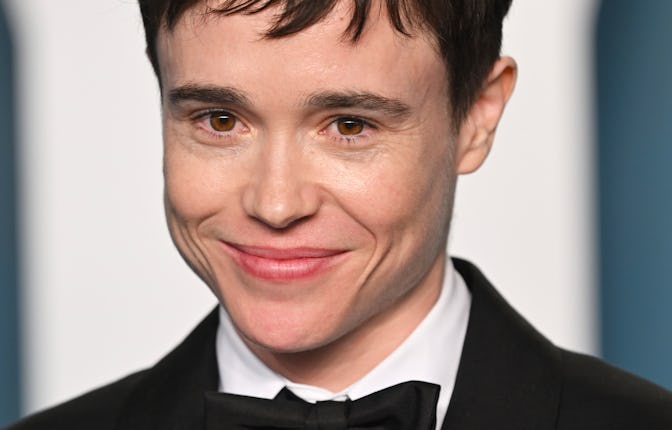Elliot Page took anti-LGBTQ+ politicians to task in a new essay
The actor got candid about the highs and lows of transitioning.

When Elliot Page came out in December 2020, he instantly became one of the most famous trans men in the world — and he’s bravely stepped forward as one of Hollywood’s most prominent voices for trans rights and visibility. It’s a role Page is much more comfortable with, now that he’s at home in his own skin — and in a new essay for Esquire, Page discusses in part the people who’ve made that transition hard, with one being comedians.
While Page is quick to highlight the joy of living an authentic life — because queer joy should be celebrated — he’s also candid about the adversity of transitioning. The politicians of course are part of that. Page writes, “Everything that’s being said about us is all the same shit that was said about LGB people: pedophiles, mentally ill, should they be allowed in the changing rooms. It’s the same. But the politicians are saying, Oh, shit! This is working! And that’s what’s scary. There are people in elected office saying that, essentially, transgender people are going to be responsible for the end of existence. That degree of rhetoric is really alarming and horrible. It’s also endless misinformation — and people buy it.”
One group that seems to have bought it is the comics that tell jokes that perpetuate transphobia and work cyclically to propel the very mentalities that prompt transphobic legislation. Page continues, “It really breaks my heart. That’s literally all we’re trying to communicate. That’s what’s so funny to me. When people say, Cancel this. Cancel that. No, they get four more comedy specials and have a jillion followers! The people getting canceled are the trans people who are suffering, or killing themselves, or murdered.” Page doesn’t mention Dave Chappelle by name, but the reference to his recent transphobic special, The Closer, and the backlash to it, feels evident.
He adds, “Jokes have an impact that hurts people. I understand that people might think it doesn’t. I understand that they’re not meaning to. But: It’s not a joke. It’s not a joke. You believe what you’re saying. You believe it. It’s not a joke. They believe it. It’s clearly not a joke. And all we’re saying is: Can you just please listen and understand the harm that it causes? That’s all we’re trying to say. That is literally all we are trying to say. And then we get inundated with hatred for saying it. But I’m sorry: You are the ones who don’t want to have the conversation. You are the ones who are so sensitive, who can’t handle people saying, Hey, can you not do that?”
Page also used the essay to get into the mundane. He speaks about his love for reading despite not going to college, and the joys he finds in cooking vegetarian food, writing every morning, and spending time with his dog. But it’s his transition that’s helped him lean into those simple moments. “For me, euphoria is simply the act of waking up, making my coffee, and sitting down with a book and being able to read,” Page wrote. “I know that may sound strange, but I can’t stress enough the degree of discomfort and struggle that I was experiencing that got in the way of everything. How could it not?” The comfort Page is speaking of can come from transition, and transphobic jokes rob people of it. Chapelle, who has doubled down on his transphobia since the backlash to his special, likely won’t change his tune. But hopefully, Page’s essay provides some perspective to anyone questioning the trans experience and illustrates the long way we have to go in fighting against transphobia.